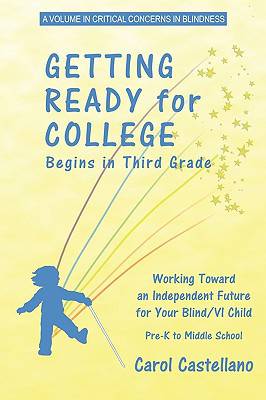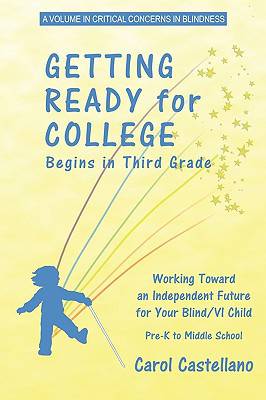
- Afhalen na 1 uur in een winkel met voorraad
- Gratis thuislevering in België vanaf € 30
- Ruim aanbod met 7 miljoen producten
- Afhalen na 1 uur in een winkel met voorraad
- Gratis thuislevering in België vanaf € 30
- Ruim aanbod met 7 miljoen producten
Zoeken
Getting Ready for College Begins in Third Grade
Working Toward an Independent Future for Your Blind/Visually Impaired Child (PB)
Carol Castellano
€ 46,45
+ 92 punten
Uitvoering
Omschrijving
A volume in Critical Concerns in Blindness Series Editor Edward C. Bell, Louisiana Tech University All parents hope for an independent future for their blind/visually impaired child. To turn that hope into a reality, parents need to understand the scope of skill development that must be addressed, along with the importance of equal expectations for the child's development, proper training, and opportunity to practice and develop skills. But what if expectations are low, training in blindness skills is scanty or even absent, and overprotection prevents the blind/VI child from learning and practicing skills? The idea of an independent future can remain a distant dream. The purpose of this book is to guide parents and teachers in fostering the blind/visually impaired child's skill development in such critical areas as academics, independent movement and travel, social interaction, daily living, and self-advocacy, so that he or she will truly be on the road to an independent future. A practical, easy to use guide, written in plain English, the book warns about common problem areas and provides ideas for getting and keeping the child's education and development on track. It highlights the interplay between skills and competence, confidence, self-respect, and the respect of others. Of the small number of books and videos available on the subject, most were written by professionals in the field and many begin with the supposition that blindness is at best sad and at worst tragic. Few --maybe none --have the ardent passion for independence that the parent of a blind/visually impaired child brings to the subject. Instead of overwhelming parents and teachers with the difficulty of the undertaking before them, Getting Ready for College Begins in Third Grade will inspire their confidence and enthusiasm for the task at hand.
Specificaties
Betrokkenen
- Auteur(s):
- Uitgeverij:
Inhoud
- Aantal bladzijden:
- 120
- Taal:
- Engels
- Reeks:
Eigenschappen
- Productcode (EAN):
- 9781617350702
- Verschijningsdatum:
- 10/06/2010
- Uitvoering:
- Paperback
- Formaat:
- Trade paperback (VS)
- Afmetingen:
- 156 mm x 234 mm
- Gewicht:
- 176 g

Alleen bij Standaard Boekhandel
+ 92 punten op je klantenkaart van Standaard Boekhandel
Beoordelingen
We publiceren alleen reviews die voldoen aan de voorwaarden voor reviews. Bekijk onze voorwaarden voor reviews.











